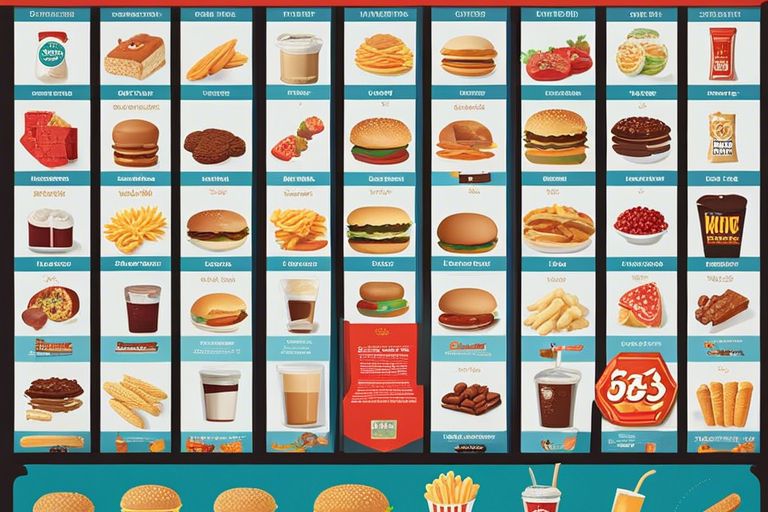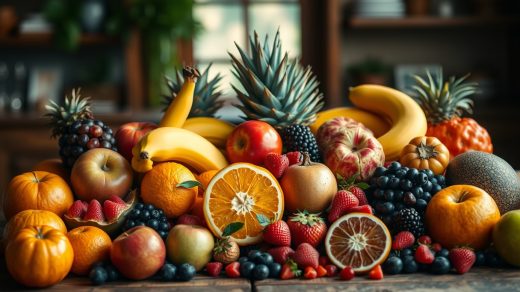Overwhelmed by the aisles of colorful packaging at the grocery store, you may be unknowingly filling your cart with items that are harming your health. In today’s blog post, we will explore 10 common foods that may seem harmless but are actually packed with hidden sugars, trans fats, and artificial ingredients that can lead to weight gain, heart disease, and other health problems. By becoming more aware of these unhealthy choices, you can take control of your diet and make more informed decisions about what you put into your body.
Key Takeaways:
- Processed Meats: Consumption of processed meats such as sausages, hot dogs, and bacon is linked to an increased risk of heart disease and certain cancers.
- Sugary Drinks: Beverages high in sugar like soda, fruit drinks, and energy drinks can contribute to weight gain, type 2 diabetes, and tooth decay.
- Fast Food: Fast food items like burgers, fries, and fried chicken are typically high in unhealthy fats, sodium, and calories, which can lead to obesity and other health issues.

The Unhealthy Culprits
While indulging in some treats every now and then can be enjoyable, it’s imperative to be mindful of the foods that can harm your health in the long run. Being aware of the unhealthy culprits can help you make informed choices and prioritize your well-being.
Foods High in Added Sugars
Added sugars can be found in a variety of processed foods, from sugary beverages to sweet treats. Consuming foods high in added sugars can lead to weight gain, tooth decay, and an increased risk of chronic diseases such as type 2 diabetes. Be cautious of products like soda, candy, pastries, and certain cereals that are often laden with added sugars. Checking nutrition labels can help you identify hidden sources of sugars and make healthier choices.
Foods High in Saturated Fats
One of the main contributors to unhealthy cholesterol levels is a diet high in saturated fats. Foods like red meat, butter, full-fat dairy products, and processed foods are common sources of saturated fats. Consuming these regularly can raise your risk of heart disease and other cardiovascular issues. It’s important to limit your intake of foods high in saturated fats and opt for healthier fats like those found in avocados, nuts, and seeds.
This overconsumption of saturated fats can have a negative impact on your overall well-being. High levels of saturated fats can lead to an increase in LDL cholesterol, commonly known as “bad” cholesterol, which can contribute to clogged arteries and heart problems. By reducing your intake of foods high in saturated fats, you can support your heart health and overall wellness.

Processed Meats
Hot Dogs and Sausages
On your list of unhealthy foods, processed meats like hot dogs and sausages should definitely have a prominent place. These meats are often made from leftover parts of the animal, mixed with additives, preservatives, and high levels of sodium. Consuming these meats regularly can increase your risk of heart disease, diabetes, and certain types of cancer.
Bacon and Cured Meats
Dogs, bacon and cured meats may be delicious, but they are also full of saturated fats and nitrates. These substances have been linked to inflammation in the body, which can lead to various health issues such as cardiovascular disease. Consuming bacon and cured meats in moderation is key to minimizing their negative impact on your health.
Meats, when processed and cured, lose much of their nutritional value and are often loaded with unhealthy components like salt and preservatives. It’s important to limit your intake of processed meats and opt for healthier protein sources like lean meats, poultry, fish, and plant-based proteins to support your overall health.
Refined Carbohydrates
Unlike complex carbohydrates, which provide sustained energy and important nutrients, refined carbohydrates have been stripped of most fiber, vitamins, and minerals during processing. Consuming too many refined carbs can lead to spikes in blood sugar levels and contribute to weight gain. Here are two common sources of refined carbohydrates that you should be mindful of:
White Bread and Pasta
Bread and pasta made from white flour are examples of refined carbohydrates that are quickly digested in your body, causing a rapid increase in blood sugar levels. This spike is followed by a crash, leaving you feeling tired and hungry soon after. Opt for whole grain versions of bread and pasta, which contain more fiber and nutrients to keep you feeling full and satisfied for longer.
Sugary Snacks and Baked Goods
Baked goods like cookies, cakes, and pastries, as well as sugary snacks like candies and sweetened cereal bars, are often loaded with refined sugars and carbohydrates. These treats may taste delicious, but they offer little in terms of nutritional value. Consuming too many sugary snacks and baked goods can lead to weight gain, cavities, and an increased risk of developing chronic diseases like diabetes. Be mindful of these foods and enjoy them in moderation as occasional treats rather than daily indulgences.
Aim to replace sugary snacks and baked goods with healthier options like fresh fruits, nuts, or homemade snacks made with whole ingredients. Your body will thank you for choosing nutrient-dense foods that provide sustained energy and support overall health.
Fried Foods
French Fries and Fried Chicken
For many people, indulging in a serving of French fries or crispy fried chicken can be a tempting treat. However, it’s important to be mindful of how often you consume these fried foods. French fries and fried chicken are typically deep-fried in oil, which can make them high in unhealthy fats and calories. This can contribute to weight gain and increase your risk of heart disease and other health issues.
Doughnuts and Fried Pastries
Fries pies, doughnuts, and other fried pastries may be delicious, but they are also loaded with sugar, unhealthy fats, and empty calories. Consuming these treats on a regular basis can lead to spikes in blood sugar levels, weight gain, and a higher risk of developing conditions like diabetes. It’s important to enjoy these foods in moderation and opt for healthier alternatives whenever possible.
This doesn’t mean you have to completely eliminate doughnuts and fried pastries from your diet. Instead, try to reserve them for special occasions or as an occasional indulgence. Pairing them with a balanced meal that includes plenty of fruits, vegetables, and whole grains can help offset some of the negative impacts of these unhealthy fried foods.
Foods High in Sodium
All Worst Foods to Eat and What to Have Instead list sodium as a major concern. Consuming high-sodium foods can lead to various health issues, including high blood pressure and increased risk of heart disease. It’s imperative to be mindful of your sodium intake and avoid foods that are excessively high in this mineral.
Canned Soups and Broths
Sodium content in canned soups and broths is often extremely high. These convenience foods may seem like a quick and easy meal option, but they are typically packed with sodium to enhance flavor and preserve the products. Opting for homemade soups and broths or choosing low-sodium varieties can significantly reduce your sodium intake and be a healthier choice for your overall well-being.
Processed Snack Foods
An alarming number of processed snack foods are loaded with sodium. Items like chips, pretzels, and crackers can contain staggering amounts of sodium per serving. Consuming these snacks regularly can quickly add up to a significant intake of sodium throughout your day. It’s important to read nutrition labels carefully and choose healthier snack alternatives that are lower in sodium to support your health goals.
Understanding the impact of high-sodium foods on your health is crucial. By being mindful of your choices and opting for lower-sodium alternatives, you can better manage your sodium intake and support a healthier lifestyle.
Hidden Dangers
Foods with Artificial Additives
Hidden in some of your favorite snacks and processed foods are artificial additives that can be harmful to your health. These additives, such as artificial colors, flavors, and preservatives, may enhance the taste and appearance of food, but they offer little to no nutritional value. They can have negative effects on your overall health, including causing allergic reactions, disrupting hormonal balance, and potentially leading to long-term health issues.
Foods with High Fructose Corn Syrup
With its sweet taste and low cost, high fructose corn syrup is a popular ingredient in many sweetened beverages, candies, and processed foods. However, consuming foods with high fructose corn syrup can increase your risk of obesity, type 2 diabetes, and heart disease. This highly processed sweetener can also lead to insulin resistance and elevated levels of triglycerides in the blood, contributing to metabolic dysfunction.
With these hidden dangers in mind, it’s important to read food labels carefully and choose whole, unprocessed foods whenever possible to avoid these unhealthy ingredients. Recall, being mindful of what you eat is key to maintaining a healthy diet and overall well-being.
Conclusion
Hence, it is crucial for you to be mindful of the foods you consume to maintain a healthy lifestyle. By being aware of the top 10 unhealthy foods to avoid, you can make better choices and prioritize nutritious options that will benefit your overall well-being. Be mindful of, small changes in your diet can lead to significant improvements in your health over time.
FAQ
Q: What are some examples of unhealthy foods?
A: Unhealthy foods include processed snacks high in sugar and artificial ingredients, deep-fried foods like french fries and fried chicken, sugary beverages such as soda and energy drinks, and high-fat fast food items like burgers and pizza.
Q: How does consuming unhealthy foods impact our health?
A: Regular consumption of unhealthy foods can lead to weight gain, obesity, cardiovascular issues, high cholesterol, diabetes, and other chronic health conditions. These foods offer little to no nutritional value and can negatively affect overall well-being.
Q: What are healthier alternatives to unhealthy foods?
A: Healthier alternatives to unhealthy foods include whole fruits and vegetables, lean proteins like chicken and fish, whole grains such as quinoa and brown rice, nuts and seeds, and dairy products like Greek yogurt and low-fat cheese. These options provide vital nutrients and are better for your overall health.



